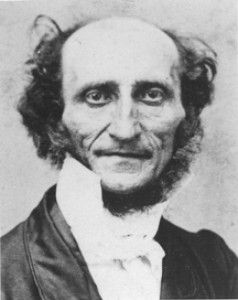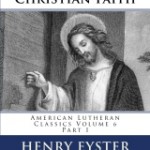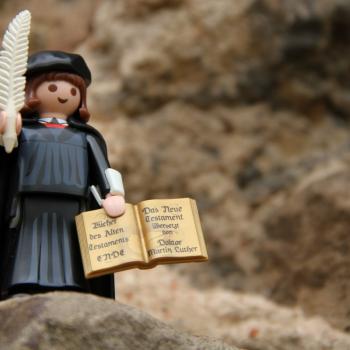Do we confessional Lutherans love the theology that is set forth in our Lutheran Confessions, or do we love a truncated reduction of it? Seems like a tautological question, in a way — I mean, after all, it’s in the name, isn’t it? “Confessional Lutheran”? Should be a QED, right? It certainly should be, yes.
However, if the barometer of internet Lutheranism is any kind of indicator†, it would seem that somewhere in the realm of “as often as not”, the latter is the case. We would all do well to follow the example of Pr. Mark Surburg in reflecting on how we have given place to this tendency towards reductionism.
Some days it seems to me that we contemporary confessional Lutherans have largely abandoned the rich tradition of…well…the Confessions, giving the lie to the putative confessionalism which we claim as a badge. The label “confessional” seems to have acquired currency as a moniker meaning as little as, “I used to be an evangelical”, or—quite frequently—“I ain’t no pietist.” This raises the question, of course: what’s a pietist? Someone who cares about good works, evidently.
A few weeks ago I commented to this effect on a Facebook thread that had devolved into the sort of censorious pietist-strawman-thrashing romp that has now become an internet Lutheran cliché:
Is pietism monolithic? I kid—of course it’s not. In all seriousness, though, it seems to have become a bit of a shibboleth: “Oh, that’s pietism,” “So-and-so is being a pietist,” etc. I wonder if such statements cause a sort of inflation, with the result that we start to lose the ability to speak coherently about movements within Lutheran theology which can actually and fairly be said to be expressions of pietism.
And, at the risk of being called a pietist (wouldn’t be the first time), I wonder if we might do well to evaluate (in a more dispassionate manner) the ways in which LCMS Lutherans are beholden (if not indebted) to pietism. Because, well — we are. The emphasis on missions, Sunday school, Bible-studies (and I’m not talking about those evil lay-led studies) — these are largely due to the influence of pietism. It’s part of our heritage. So what do we want to do with that? “Écrasez l’infâme”?
Let’s not be hasty—Luther was heavily influenced by Tauler and the Theologica Germanica; Johann Arndt was the teacher of Johann Gerhard; Phillip Jakob Spener bequeathed a rich devotional hymnody to the Church, including “Soul Adorn Thyself With Gladness” — try calling that one “anti-sacramental”! August Hermann Francke was a prodigious and orthodox Biblical scholar. Are we to dismiss all of these men? I hope not. … [P]eople are getting a very sloppy and truncated understanding of the term “pietism” so that when they hear of such men … being associated with “pietism” they dismiss them out of hand. “Oh! They’re pietists. They must be bad.” That’s really sad.
We shouldn’t speak of anybody as if they were the devil himself unless they’re…well…the devil himself. Again, “pietism” is far from monolithic.
It is written in the prophet, Jer. 31:33: ‘I will put My Law in their inward parts, and write it in their hearts.’ And in Rom. 3:31, Paul says: ‘Do we, then, make void the Law through faith? God forbid! Yea, we establish the Law.’ And Christ says, Matt. 19:17: ‘If thou wilt enter into life, keep the commandments.’ Likewise, 1 Cor. 13:3: ‘If I have not charity, it profiteth me nothing.’ These and similar sentences testify that the Law ought to be begun in us, and be kept by us more and more, i.e., that we are to keep the Law when we have been justified by faith, and thus increase more and more in the Spirit.
That’s the Apology, Article III, sections 2-3. I quote it often without citing my source. Guess what people call me when I do. You get three guesses, and the first two don’t count…
Guess who else would probably fall under the “confessional” Lutheran knife and be kicked to the curb as a dirty “pietist”? (Besides Luther, Chemnitz, and Gerhard, of course…) The answer may surprise anyone who has read quoted The Proper Distinction Between Law & Gospel.
The following barn-burner of a sermon by the patriarch of the LCMS, Carl Ferdinand Wilhelm Walther, is yet one more item in a growing dossier of evidence I’ve been collecting that suggests that “we are all reductionists now”—evidence which implicates me just as much or more as anyone, by the way. And don’t think that it’s an anomaly: here are some more of Walther’s sermons. Just reading the titles will put the fear of God in you. Sure does me. And is that a bad thing?
So here’s the question: can you imagine preaching/hearing this sermon in your Lutheran church today?
Pastors, here’s a challenge for you: take this sermon out for a spin some Sunday (when your pericope allows); see if it’ll preach. And then see if you get to keep your job.
- UPDATE – Related post: “Silent no more: Luther lays down the law on how to preach the law (200 proof version)” by Just & Sinner editor Nathan Rinne (go to author page)
† I don’t think it is, really. I think there’s a large silent majority of Lutherans who instinctively eschew the sort of radicalism which is often represented as the genuine article of Lutheranism online.
C. F. W. Walther
Sermon for the First Sunday in Lent, 1855
(E. Myers, trans.)
Grace and peace be multiplied unto you through the knowledge of God and of Jesus Christ our Lord. Amen.
In Him our precious Savior, dearly beloved hearers!
“I have trodden the winepress alone, and of the people there was none with me. …I looked, and there was none to help.” (Isaiah 63:3,5). Thus says the Messiah in the 63rd chapter of Isaiah. Here He testifies that He alone would crush the serpent’s head. He alone would carry out the work of redemption. He alone would win salvation for imprisoned and lost mankind, and that in this work no one in heaven and on earth would nor could help or cooperate with Him.
As we study the story of the reconciling and redeeming suffering of our Savior, we see this prophecy literally fulfilled. When the Lord entered upon His great suffering, He was immediately forsaken by everyone. In Gethsemane while He was writhing in the dust like a crushed worm, sweating blood and wrestling with death, all His disciples, even Peter who had wanted to die with Him, were asleep, and none wanted to watch with Him for even one hour. After this, when He was handed to sinners, Judas, one of His own disciples, had been the one to betray Him. Yet another, Peter, lest he might share this beginning suffering, denied Him. All the other disciples fled. In that moment Zechariah’s prophecy was fulfilled: “Awake, O sword, against my shepherd, and against the man that is my fellow, saith the Lord of hosts: smite the shepherd, and the sheep shall be scattered.” (Zechariah 13:7).
True, later on we find John, Mary, and other godly women at the hill of Golgotha. But they were there not to suffer and die with Christ, only to lament and weep over Him. Forsaken by God and men, He had to cry out, “I have trodden the winepress alone, and of the people there was none with me; …I looked and there was none to help.” Yes, at the end He even exclaimed, “My God, my God, why hast Thou forsaken me?”
And, my dear hearers, it could not be otherwise. God is righteous. He therefore had to punish sin. He can crown only him with eternal life who has done His will all his life and is perfectly righteous. Therefore He who wanted to redeem us fallen men from the misery of our sins and bring back our lost salvation had to be a perfectly holy and pure man so he could suffer and die innocently in our place. He also had to be God Himself so that He could fulfill the Law for us, conquer sin, death, and hell and win perfect righteousness, innocence and blessedness for us.
Therefore no angel could accomplish this work, to say nothing of sin-burdened man himself. Only Jesus Christ, God and man in one person, could do this. And as God could not have any helper in creating the world out of nothing, so also at the second creation, the redemption of the world, the Son of God did and could not have any helper in any creature. He trod the winepress of God’s wrath alone, and He alone could tread it.
Woe therefore to the man who wants to be saved and does not seek his salvation in Christ alone, who wants to justify himself in God’s eyes, and earn something by himself before God!
We therefore read in the hymn:
Christ says: “Come, all ye that labor
And receive My grace and favor;
They who feel no want nor ill
Need no physician’s help nor skill.
“Useless were for thee My passion,
If thy works thy weal could fashion.
This feast is not spread for thee
If thine own Savior thou wilt be.”
(TLH, 311, 6.7.)
But, my friends, as it is irrefutably true that Christ alone has earned salvation, so also it is true that after we have received salvation by true faith, we must become workers together with God. The apostle Paul testifies to this in today’s Gospel text. Therefore let us today ponder this important, necessary and refreshing truth with heartfelt devotion.
Scripture text: 2 Corinthians 6:1-10. We then, as workers together with him, beseech you also that ye receive not the grace of God in vain. (For he saith, I have heard thee in a time accepted, and in the day of salvation have I succoured thee: behold, now is the accepted time; behold, now is the day of salvation.) Giving no offence in any thing, that the ministry be not blamed: But in all things approving ourselves as the ministers of God, in much patience, in afflictions, in necessities, in distresses, In stripes, in imprisonments, in tumults, in labors, in watchings, in fastings; By pureness, by knowledge, by longsuffering, by kindness, by the Holy Ghost, by love unfeigned, By the word of truth, by the power of God, by the armour of righteousness on the right hand and on the left, By honour and dishonour, by evil report and good report: as deceivers, and yet true; As unknown, and yet well known; as dying, and, behold, we live; as chastened, and not killed; As sorrowful, yet alway rejoicing; as poor, yet making many rich; as having nothing, and yet possessing all things.
My friends, the first verse of the text just read is quoted in our public confessions as proof of the fact that when a person is converted he must then also work together with God. And that is absolutely correct. When at the beginning of our text the apostle writes, “We then, as workers together with him, beseech you also that ye receive not the grace of God in vain,” he not only calls himself a “worker together with God,” but he also sets himself up as an example to the Christians at Corinth whom they are to imitate, and admonishes them that they also are to be workers together with God. With the enabling of the Holy Spirit permit me to present to you
MAN’S WORKING TOGETHER WITH GOD AFTER CONVERSION.
I will show you
That Before Man is Converted he Cannot Work Together with the Holy Ghost, and
That After his Conversion Man not only Can but Must Work Together with God if he does not want to Lose God’s Grace Again.
Faithful and merciful God, in order to save us sinners You not only let Your only begotten Son become man and gave Him up to suffering and death, but through Your holy Word You have also prescribed the way in which You intend to lead us to that salvation won for us. Oh, open our hearts and ears by the gracious leading of Your Holy Spirit, as we want to hear from Your holy Word what we are to do to receive eternal life. Rid us of all our spiritual lack of power, our indifference, sleepiness and laziness. Rid us of all ungodly thoughts, worries and desires. Enlighten and sharpen our understanding. Heal and strengthen our will. Direct our entire soul upon the one thing needful, and make this hour an hour of awakening, so that its fruits will remain for eternal life. Hear us, oh God, for the sake of Jesus Christ, Your dear Son, our only Savior. Amen! Amen!
[1. Before Man is Converted he Cannot Work Together with the Holy Ghost]
“We then as workers together with him, beseech you also that ye receive not the grace of God in vain” begins Paul in our text. Here the apostle admonishes Christians to work together with God. At the same time he points out what they could have done before their conversion. He calls their conversion the receiving of God’s grace. Thus he testifies that the awakening, the enlightening, the rebirth, in short, the conversion which they had already experienced was a work of pure divine grace to which they could not have contributed in the least.
And that is true. Before a person is converted he cannot work together with the Holy Ghost.
Unfortunately there are many different errors on this point even among so-called Christians. Some suppose that by nature man is good, and only becomes corrupt and wicked through poor training and evil example. Others suppose that at birth man is not already good, but like a clean tablet where neither evil nor good is written as yet. By nature man [supposedly] has a free will to choose the good and reject the evil including in spiritual matters, in matters concerning his soul and salvation. By nature man supposedly has the power to decide to go the right or the wrong way. He supposedly can will to do good, and if he firmly enough resolved to do it, he could.
Others suppose that man cannot finish the work of conversion, but that he can at least begin it, and if he does, the Holy Spirit will help him along. Others think that man can and must at least prepare himself for grace, and if he does, God will extend him a helping hand. Finally, still others suppose that man can indeed do nothing to begin his conversion, but when God has made the start, then the power of his will, by nature dormant as it were awakens, and then man himself can carry on and finish the work begun by God.
But all these suppositions about the free will of an unconverted man in spiritual matters are nothing but gross, harmful errors. They merely make man proud and secure and harden him in his self-confidence and self-righteousness, flatter him, and rob God’s grace of its honor.
It is indeed true that even after the fall man by nature has a free will in secular and civic affairs. Oh yes, an unconverted person has a free will to build a house, to cultivate or not to cultivate a field, to learn and carry on or not to learn and carry on a trade or skill, to read and hear God’s Word or not, to curse or not to curse, to get drunk or not, to commit or not to commit adultery and fornication, to steal or not to steal, although even in these latter things a person can fall so deeply into the habits and snares of Satan that he is led from sin to sin like an animal tied up for slaughter, unable to resist. But in spiritual things, in those works which please God, in the true fulfillment of the Law, in the knowledge and acceptance of the Gospel, in faith in Christ, in fear, love and trust in God above all things, in short, in that which belongs to our salvation, to our true repentance and heartfelt conversion, man has no free will. There he is not only weak, but utterly powerless. In an unconverted person there is not even one tiny spark of goodness.
Hear yourself what the Scriptures teach us on this point! “The imagination of man’s heart is evil from his youth.” (Genesis 8:21). “God looked down from heaven upon the children of men, to see if there were any that did understand, that did seek God. Every one of them is gone back: they are altogether become filthy; there is none that doeth good, no, not one.” (Psalm 53:2, 3). Again we read: “Without me, ye can do nothing.” (John 15:5). And: “That which is born of flesh is flesh; and that which is born of the Spirit is spirit.” (John 3:6).
St. Paul writes: “The natural man receiveth not the things of the Spirit of God, for they are foolishness unto him; neither can he know them, because they are spiritually discerned,” (1 Cor. 2:14). And: “No man can say that Jesus is the Lord, but by the Holy Ghost.” (1 Cor. 12:3). And again: “Not that we are sufficient of ourselves to think any thing as of ourselves, but our sufficiency is of God.” (2 Cor. 3:5). We read: “For it is God which worketh in you both to will and to do of his good pleasure.” (Philippians 2:13). Yes, in order that no one might attempt to ascribe any power to do good to man in his unconverted, natural state, Paul writes: “Even when we were dead in sins, hath he quickened us together with Christ. (by grace ye are saved).” (Eph. 2:5).
You see, my friends, according to God’s Word every one of us is by nature, that is, before his conversion, spiritually dead. Just as a corpse cannot see, hear, feel or move, so a natural unconverted person cannot truly know and understand anything spiritual, anything concerning the salvation of his soul. He cannot think properly nor resolve to do anything about it. Even when natural man is correctly taught the way from God’s Word, he is far from agreeing thereto. As long as he is not enlightened by the Holy Spirit, he considers it all folly and fanaticism. And when exhorted to be converted and to do good works, he can do nothing but resist as long as the Holy Spirit is not working in him. In spiritual things man is therefore by nature not only like a stick or a stone, neither wanting nor able to act; he is worse than a stick or a stone because he can oppose the operation of grace working in him.
Therefore just as fallen Adam would not have returned to God had not God first come to him in grace, sought him out and led him back to Himself, so God must by His grace first come to all other men with His word and Spirit. Otherwise not one person in the whole world would be converted to God. Moreover, as man had no part in his being naturally created, begotten, and born into the world, so also now all fallen men can themselves do nothing to be created anew, to have their stony heart changed, and to be born again. As little as a corpse can assist in being made alive, so little can an unconverted, spiritually dead man assist in being made spiritually alive. Man cannot convert himself or assist the least in his conversion. Only subjected and surrendered to God’s work he is awakened, enlightened, brought to faith and converted. Yes, even before man is surrendered to God’s work of conversion, God Himself must first remove the resistance found in him before his conversion, and free his will which by nature is bound and enslaved.
Perhaps many will think: Is not that a dangerous doctrine? When men hear that they themselves cannot in any way contribute to their own conversion, but that God must do everything, will they not say: Well, if God must do it all, I will just wait with my hands in my lap until God converts me!? I reply: It is true that there are people who thus use the doctrine of their own absolute powerlessness to contribute to their own damnation. But my friends, that is not the use of this doctrine, but a shameful and harmful misuse. Far from making us secure and hindering repentance, the teaching that God alone can convert us is rather the most powerful possible awakener to repentance.
Judge for yourselves: When we hear from God’s Word that we are dead in sin and can do nothing but resist Him, does that not require us to despair completely of ourselves, be afraid of ourselves, cast ourselves down before God as a wretched, lost, rejected, and condemned creature, and rely completely upon God and cry to Him for mercy and help?
Perhaps you say now: But if we can do nothing, we cannot even do that either! It is true that we cannot do this in our own strength. But every time God’s word is preached to us, every time we read God’s Word or are merely reminded of it, God comes to us in His grace, knocks at the door of our heart and not only demands such despair of ourselves, but also Himself works this within us. It is then as the apostle says in our text, “Behold, now is the accepted time; behold, now is the day of salvation.” Therefore he also cries to the Philippians: “Work out your own salvation with fear and trembling.” And what reason does he give for doing that? He adds: “For it is God which worketh in you both to will and to do of his good pleasure.”
Hence, just because only God alone can convert us, fear and trembling should be in us lest God’s word be hindered in us by our own fault. Just because we ourselves have no power at all to work or assist in our own conversion, we are required for the sake of our salvation not to resist willfully and stubbornly every time God works in us and wants to convert us. And the fact that we do not have any power to work our conversion also warns us not to postpone our conversion a single hour. It demands that we answer God immediately when He greets us, open to Him instantly when He knocks, arise promptly from the sleep of sin when He awakens us.
If we could convert ourselves whenever we wanted to, then we could possibly say: Not today, but tomorrow; not this year, but the next; not now in my youth while I am healthy, but when I become old and sick. But just because we can do nothing toward our conversion, because God alone must do everything, we should think the moment God begins to work in us: Now, now is the time. For, behold, it could happen that if today God wants to convert us but we want to be converted not today, but next year – next year God may not want to convert us, but rather may suddenly and unexpectedly drag us out of this life before His stern judgment in our unconverted state. Hence a song tells us:
God’s grace stands ready to receive
A sinner who to Him will cleave.
But who despite God’s mercy’s claim
Persists in sinfulness and shame
And deems his soul’s salvation naught
By God’s wrath will to hell be brought!
This day, while it is yet today
Repent, forsake your sinful way!
In health and youth your cheeks are red
This day, but soon you may be dead
If unconverted you should die
In hell forever you will sigh
Then we will have waited too long and will be lost forever. Therefore the Bible also warns: “Be not deceived; God is not mocked.” (Gal. 6:7). For no one can use his helplessness and weakness as an excuse. We are unable to come to Him – yet He wants to draw us to Himself. We cannot accept God in our hearts, yet God wants to open our hearts as He did Lydia’s. We are unable to see what belongs to our peace, yet He wants to enlighten us. We are unable to receive a wholesome fright of hell, yet He wants to work this fright within us.
Therefore he who still remains in his sins and impenitence has hardened his heart himself. Let him then bemoan his lot when he is on his way to hell.
[2. After Man’s Conversion he not only Can but Must Work Together with God if he Does not Want to Lose God’s Grace Again]
However, my friends, once by God’s grace a person is converted, comes to faith and thus to grace and forgiveness of sins, then he will also no longer merely submit to the operations of the Holy Spirit, but will and must work together with Him. And this is the second point upon which I wish to enlarge briefly.
While most unconverted people think that they can bring about their conversion themselves without the Holy Spirit, so on the other hand not a few think that after they are converted, they need not work together with Him.
Yes, it is true that as God Himself must make the start of our salvation in our conversion, so He must also work its continuance to the end. Paul says that God must work the willing and the completion within us. (Philippians 1:6; 2:12). Peter says that God regenerates us and that He alone is the one by whose power we are kept through faith unto salvation. (I Peter 1:5). It is therefore true that even after his conversion no man can preserve and keep himself in the faith by his own strength.
But far be it that this should exclude man’s work together with the Spirit after his conversion. It rather includes it. For conversion is nothing else but the freeing of the will which before conversion was bound to sin and torn away from God. Therefore a converted man has been enabled and is therefore solemnly obliged not to serve sin, but God, whose redeemed servant he has become. For “if the Son shall make you free, ye shall be free indeed,” says the Lord Himself. (John 8:36). Through conversion man receives divine light, a new divine life, new divine desires and impulses, and new divine powers in his heart. All this is a treasure, a pound, capital with which the converted Christian is to work in order to bring God his own with abundant increase. While the unconverted man must not resist God’s grace willfully so that he may be converted, the converted man on the contrary must work together with all the divine powers given him lest he lose his conversion again.
It is indeed true that even the converted man can work together with God only as long as God rules, guides, and leads him with His Holy Spirit. The moment God withdraws His hand and takes His Holy Spirit from him, even the converted person falls back into his old spiritual death. But God forsakes no one who has not first forsaken Him. The Spirit of God is never idle where He dwells, but continually impels God’s converted children to follow after holiness, without which no man shall see the Lord. (Hebrews 12:14). A “Christian” who does not want to strive without ceasing against the sin which always assails and clings to him, who does not want to strive earnestly for those virtues which please God and are difficult burdens to his fleshly nature, who does not want to watch faithfully over his heart and life, who does not want to receive renewed power and grace through the diligent use of the means of grace and daily ardent prayer, will soon cease being a Christian altogether. The word of the Lord is fulfilled in him: “He that hath, to him shall be given; and he that hath not, from him shall be taken even that which he hath.” (Mark 4:25). The oil in his lamp of faith, the living power of God, is gradually used up. The flame finally is completely extinguished, and lo, when the Bridegroom comes, he cannot go to meet Him.
Yes, most are lost because they want to improve themselves on their own even before they experience the operation of the Holy Spirit. Hence they never attain real improvement. But many are also lost because they do not want to work together with the Holy Spirit after their conversion by God’s grace! They suppose that once they have fought the difficult battle of repentance they, as it were, have entered a haven of rest. The thought that God’s grace does everything, which would fill them with the joy and zeal to live a truly sanctified life, they instead allow to lull them into the sleep of a fancied security. They do not watch. They do not strive. They do not pray. They do not work out their own salvation with fear and trembling, and lo! they are lost.
Oh my friends, let us listen to the apostle’s words of our text: “We then, as workers together with him, beseech you also that ye receive not the grace of God in vain.” What can be more terrible than to have received grace after having known wrath, but having squandered God’s grace to reap wrath after all! What can be more terrible than to be full of the hope of salvation and heaven only to plunge suddenly into hell and damnation.
From this, Oh God, graciously preserve us for Jesus’ sake. Amen.
+SDG+
















